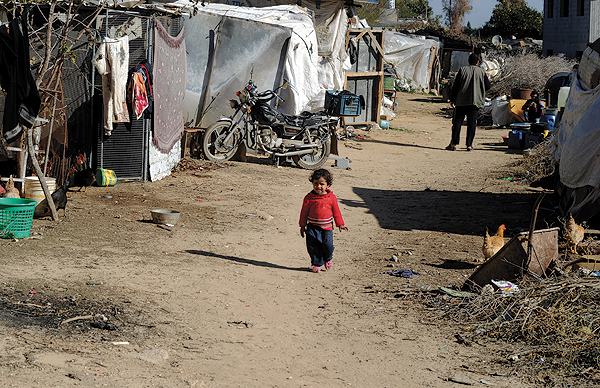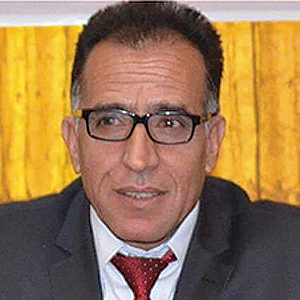
We cannot take a comprehensive look at the situation of human rights in the Gaza Strip without considering the wider context of human rights in the State of Palestine. The effective blockade of the Strip has isolated it from the West Bank and the rest of the world. A bitter political acrimony between the parties governing each of the two Palestinian territories has resulted in two completely separate governments, having a dire impact on both the state and citizens’ human rights in the State of Palestine.
The Government of National Consensusi announced by the Fatah and Hamas political parties in April 2014 did not effectively take hold (in spite of some attempts), and consequently has failed to perform governance functions in the Gaza Strip, as fundamental points of contention persisted between them. This failure to govern “in unity” led to a compounding of critical issues – remuneration of employees, unification of the judiciary, ratification and effective implementation of legislation, resolution of security and border issues. With no consensus government, a “shadow government” took hold, run by Hamas and operating de facto as the executive authority in Gaza.
Suffocation and siege imposed for over a decade exert an additional toll, the sum of which impacts gravely on Palestinians’ political, economic, social, and cultural rights. Those denied in Gaza are extremely basic – movement, travel, work, education, health, and life itself. In addition, the economy is subjected to wide-ranging security restrictions imposed without substantiation by Israel, severely impeding the growth and development of a viable economy through restricting inputs to manufacturing and access to markets for goods. Particularly acute is the severe shortage of construction materials such as cement, iron, and aggregate – vital commodities for the reconstruction of housing, schools, and basic public facilities destroyed by Israeli forces in the summer of 2014. Significantly, over 65,000 Palestinian individuals remain homeless in the Gaza Strip facing difficult economic conditions and scarce job prospects, and surviving harsh interim living arrangements with no reconstruction of their homes in sight.ii
♦ The rights situation in the Gaza Strip continues to deteriorate under the now-decade-long Israeli blockade. Political actors, duty bearers, and the community of nations as third-state parties have the responsibility to ensure adherence to international standards, including protection of the social and political rights of Palestinians in Gaza.
In spite of ample data and numerous reports by both international and Palestinian organizations reflecting the urgency of the situation of Palestinian human rights, the blockade continues and with it an increasingly alarming poverty rate. Currently at 43.2 percent,iii it reflects a severe lack of job opportunities due to the ongoing siege – increasing the number of socially marginalized people and generating an acute sense of injustice. Such conditions threaten to destabilize civic peace in the Gaza community as they foster the radicalization of society, and in particular intolerance and hatred among youth who are vulnerable to extremist ideas. Such trends constitute a real and grave danger to the social fabric.
Crucially, this development increases the complexity of the lives of Palestinians in the Gaza Strip amidst a serious deterioration of human rights, attacks on public freedom, and a prevailing weakness of the judicial system. A severe shortage of judges and lack of financial means to pay them will necessarily impact the course of justice and rule of law, as will the enactment of new laws through the parliamentary Change and Reform Blociv in the Gaza Strip and by presidential decree in the West Bank, deepening the internal Palestinian split and undermining efforts towards building a unified Palestinian justice system. As things stand, the Gaza government is unable to provide basic services that constitute fundamental rights, such as potable water and provision of consistent electrical supply due to resource restrictions and political isolation. The state of public freedoms remains in free fall with restrictions now a regular part of people’s lives. Journalists and social media activists live in an environment of intimidation and threats. Peaceful assembly brings with it risk of arrest and punishment. Conditions of detention beg for systematic monitoring and disciplinary measures for those who violate procedures. Citizens are devastated by the injustice and oppression, disempowered to improve the painful reality of their daily lives, and hopeless of their children’s future.
Political powers both locally and internationally bear responsibility for Gaza under international law. It is incumbent on parties to the Government of National Consensus, Israeli authorities, the United Nations, and the international community to step up and assume their responsibilities as duty bearers to protect human rights in the Gaza Strip. Most immediately, the de facto government in Gaza bears a serious responsibility to improve administration in support of citizens – ameliorating living conditions, respecting human rights, and adhering to an acceptable minimum if not the full extent of its legal obligations.
» Mustafa Ibrahim is a human rights activist and writer for various local newspapers and electronic media outlets. He is a legal researcher at the Gaza office of the Independent Commission for Human Rights, as well as a board member of the Community Media Center and the Palestinian Institute for Communication and Development.
Translated from Arabic by: Ayah Abu Basheer and Wafaa Al-Kafarna.
i The Government of National Consensus was in effect between June 2, 2014 and June 17, 2015, under the leadership of President Mahmoud Abbas.
ii United Nations Office for the Coordination of humanitarian Affairs (OCHA), available at: https://www.ochaopt.org/content/un-coordinator-humanitarian-aid-and-development-activities-calls-international-support-bring.
iii United Nations Relief and Works Agency (UNRWA), Occupied Palestinian Territories Emergency Appeal 2017, available at https://www.unrwa.org/sites/default/files/content/resources/2017_opt_emergency_appeal.pdf.
iv As a result of January 25, 2006 Palestinian Legislative Election, Hamas – represented by Change and Reform Bloc – achieved a great victory and won 74 seats of the total 132 PLC seats, while Fatah won just 45. Subsequently, Hamas temporarily formed a majority government within the PLC, but the refusal of other parties to participate in governing, aided by the international boycott of the PA under Hamas, did not allow it to function. As a result of these factors, in 2007, Hamas took control of Gaza by force and has exercised control and functioned as the local authority in Gaza ever since.


